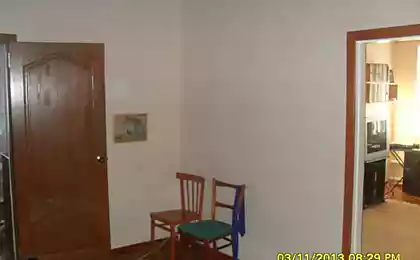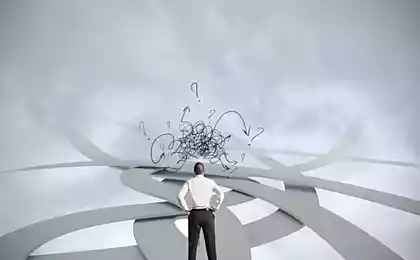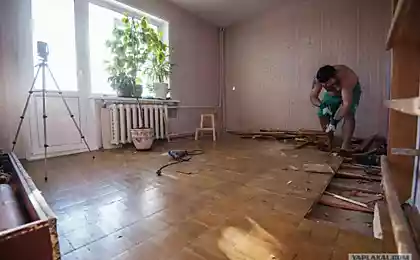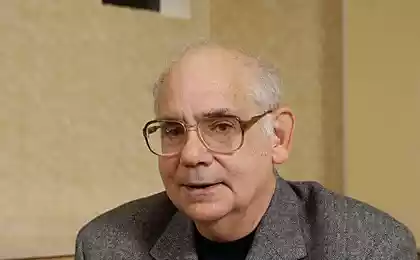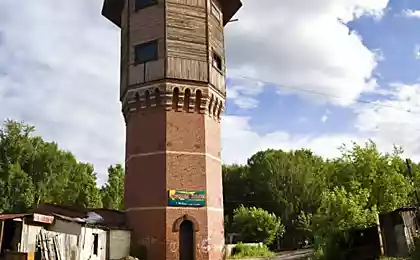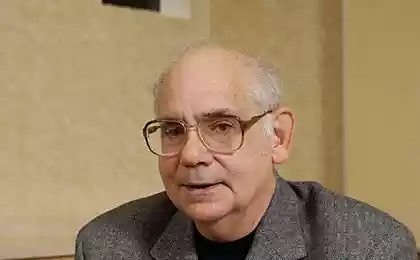594
"The effect of the doorway": why do we forget why they came
Does not that sound familiar: rising from his chair and confident going into the next room with a specific purpose, we crossed its threshold, suddenly realize that you have forgotten completely, and why, in fact, to come from? The reason for this curious phenomenon lies in the features of our memory mechanisms. Below we explain the phenomenon of "doorway effect» (Doorway Effect).

In fact, the association with a doorway - a special case of a more general phenomenon manifests itself in our lives in many situations. Suffice it to recall how to open the fridge, we forget that, in fact, we need him. Or, for example, a very common situation, when listening to the interlocutor, you are forced to leave a question for later, waiting for the opponent to finish his monologue. And when, finally have the opportunity to comment on the above, you will be surprised and annoyed find that you forget all about what to say. Sometimes in these situations to restore the chain fails, and sometimes any attempt to break up a insurmountable obstacle. What is happening at this moment?
It turns out that our perception of what is happening around the same time captures at different levels. As in the parable of the three builders of one brigade, one of which, in his opinion, is committed to putting one brick on another, the second builds a wall, and the third creates a temple. In fact, they are all at the same time and do one thing and another, and the third. And our attention is able to switch between the different levels of perception, but at any given point in time to be just one of them. The language of the parable, we focus on how to put another brick or present process in its sequence, or think about the ultimate goal of the work in. If the waste brick masonry skill we have, we are totally focused on the particular action. By analogy, the driver of a novice, which is bad drivers strongly reflects on when to change gear or press the pedal, as opposed to a professional, which in a way can quite comfortable to talk with a passenger or to assess the originality of the local attractions.
The above feature of our perception of reality is directly related to the "effect of the doorway," appearing in the moment when our attention wanders between the different levels of perception, often not stopping there, "where we needed" until recently. For example, with the person above. Do you intend to protest your opponent and your attention totally focused on this end, but must contend with the fact that the other party should be given a finish. The standby time when you start hard to find a way to break into the conversation, because the operational objective has changed, attention shifts to another level. When the long-awaited opportunity to speak, finally, there is, you will find that there is nothing to say already, attention switched to the desired wave is no longer possible.
A similar mechanism works also when you forget what came into the room. For example, you need to take the keys in the far room of your home, to go to the store across the street. The level of "take the keys" changes to the level "to get to the bedroom," and on the road you still notice left by someone on the eve of the cup, you decide to include the kitchen. The fact that at this moment your attention is switched several times from one plan to another, you do not notice, but the more the more such switching occurs on the way to the bedroom, the more likely it is that when you come to it you'll wonder: why, in fact, I here was?
To find the answer in these situations can help unwinding shaped imaginary "film" in the reverse order when you mentally get out of the bedroom and comes back the same way.
The scientific term "doorway effect" was introduced by a psychologist from the USA Radwanska Gabriel (Gabriel A. Radvansky) in 2011, and the occasion was the experiment conducted by them. The challenge before the participants was to transfer between the virtual room of the house, created Rodvanskim and fulfill various tasks at the same time on memorizing. The experiment has confirmed unequivocally: people are much more likely to forget what he saw or heard after passing through the doorway. At the same time he could walk the same distance in the big room and keep the goal in mind, but it was worth it to go from room to room, the information is "erased". A similar effect was confirmed in the second experiment conducted in the real house. The scientist concluded that doorway in this case plays the role of the next episode of the information carrying serious additional strain on our memory, complicating attempts to remember the initial promise.
Knowing how the "effect of the doorway," we will be able to avoid such problems in the future. And when faced with a problem, enough to walk mentally or physically in their memory heads backwards until the desired recollection is restored.
Tom Stafford (Tom Stafford) bbc.com
That's all, you had a simple service to select Dronk.Ru sophisticated technology. Do not forget to subscribe to our blog, will be much more interesting ...




< br> Why online retailers give the money for the purchase? Review Xiaomi Mi Air Purifier 2 or how to clean the air of a megacity? Return the money - Choosing a cashback service to Aliexpress
Source: geektimes.ru/company/dronk/blog/276920/

In fact, the association with a doorway - a special case of a more general phenomenon manifests itself in our lives in many situations. Suffice it to recall how to open the fridge, we forget that, in fact, we need him. Or, for example, a very common situation, when listening to the interlocutor, you are forced to leave a question for later, waiting for the opponent to finish his monologue. And when, finally have the opportunity to comment on the above, you will be surprised and annoyed find that you forget all about what to say. Sometimes in these situations to restore the chain fails, and sometimes any attempt to break up a insurmountable obstacle. What is happening at this moment?
It turns out that our perception of what is happening around the same time captures at different levels. As in the parable of the three builders of one brigade, one of which, in his opinion, is committed to putting one brick on another, the second builds a wall, and the third creates a temple. In fact, they are all at the same time and do one thing and another, and the third. And our attention is able to switch between the different levels of perception, but at any given point in time to be just one of them. The language of the parable, we focus on how to put another brick or present process in its sequence, or think about the ultimate goal of the work in. If the waste brick masonry skill we have, we are totally focused on the particular action. By analogy, the driver of a novice, which is bad drivers strongly reflects on when to change gear or press the pedal, as opposed to a professional, which in a way can quite comfortable to talk with a passenger or to assess the originality of the local attractions.
The above feature of our perception of reality is directly related to the "effect of the doorway," appearing in the moment when our attention wanders between the different levels of perception, often not stopping there, "where we needed" until recently. For example, with the person above. Do you intend to protest your opponent and your attention totally focused on this end, but must contend with the fact that the other party should be given a finish. The standby time when you start hard to find a way to break into the conversation, because the operational objective has changed, attention shifts to another level. When the long-awaited opportunity to speak, finally, there is, you will find that there is nothing to say already, attention switched to the desired wave is no longer possible.
A similar mechanism works also when you forget what came into the room. For example, you need to take the keys in the far room of your home, to go to the store across the street. The level of "take the keys" changes to the level "to get to the bedroom," and on the road you still notice left by someone on the eve of the cup, you decide to include the kitchen. The fact that at this moment your attention is switched several times from one plan to another, you do not notice, but the more the more such switching occurs on the way to the bedroom, the more likely it is that when you come to it you'll wonder: why, in fact, I here was?
To find the answer in these situations can help unwinding shaped imaginary "film" in the reverse order when you mentally get out of the bedroom and comes back the same way.
The scientific term "doorway effect" was introduced by a psychologist from the USA Radwanska Gabriel (Gabriel A. Radvansky) in 2011, and the occasion was the experiment conducted by them. The challenge before the participants was to transfer between the virtual room of the house, created Rodvanskim and fulfill various tasks at the same time on memorizing. The experiment has confirmed unequivocally: people are much more likely to forget what he saw or heard after passing through the doorway. At the same time he could walk the same distance in the big room and keep the goal in mind, but it was worth it to go from room to room, the information is "erased". A similar effect was confirmed in the second experiment conducted in the real house. The scientist concluded that doorway in this case plays the role of the next episode of the information carrying serious additional strain on our memory, complicating attempts to remember the initial promise.
Knowing how the "effect of the doorway," we will be able to avoid such problems in the future. And when faced with a problem, enough to walk mentally or physically in their memory heads backwards until the desired recollection is restored.
Tom Stafford (Tom Stafford) bbc.com
That's all, you had a simple service to select Dronk.Ru sophisticated technology. Do not forget to subscribe to our blog, will be much more interesting ...




< br> Why online retailers give the money for the purchase? Review Xiaomi Mi Air Purifier 2 or how to clean the air of a megacity? Return the money - Choosing a cashback service to Aliexpress
Source: geektimes.ru/company/dronk/blog/276920/


